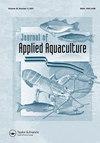Effects of dietary supplementation of endo-(1,4)-β-xylanase in plant-based diets on growth performance, hindgut microbial diversity, and blood chemistry in large on-growing African catfish (Clarias gariepinus)
IF 0.8
Q3 FISHERIES
引用次数: 4
Abstract
ABSTRACT The study aimed to investigate the impacts of dietary supplementation of endo-(1,4)-β-xylanase in high plant-ingredient diets in on-growing African catfish (Clarias gariepinus). A high plant-ingredient basal diet was supplemented with exogenous xylanase at 0 (Control diet), 100, 150, and 200 ppm, and fed to on-growing (initial weight ca 500 g) fish for a duration of 91 days. Growth parameters, fillet proximate composition, hindgut microbial diversity, hindgut short-chain fatty acid concentration, and blood chemistry parameters were monitored. There were no effects on growth parameters, fillet proximate composition, hindgut short-chain fatty acid concentration, and blood chemistry parameters. Dietary xylanase supplementation caused a significant shift in hindgut microbial diversity, where the 200 ppm treatment showed significantly lower Shannon diversity (2.15 ± 0.13) than the control (2.78 ± 0.21). The significantly lower microbial diversity indicates that enzyme supplementation selectively benefitted certain microbial populations in the hindgut, presumably through the release of prebiotic compounds during non-starch polysaccharide hydrolysis. It is concluded that dietary xylanase supplementation can significantly impact hindgut microbial communities in on-growing African catfish, and it is recommended that future work investigate whether dietary xylanase supplementation can benefit aquaculture production performance in younger fish.植物性日粮中添加内-(1,4)-β-木聚糖酶对生长中的非洲鲶鱼(Clarias gariepinus)生长性能、后肠微生物多样性和血液化学的影响
摘要本研究旨在探讨在高植物成分日粮中添加内-(1,4)-β-木聚糖酶对生长中的非洲鲶鱼(Clarias gariepinus)的影响。在高植物成分基础日粮中添加0(对照日粮)、100、150和200ppm的外源木聚糖酶,并将其喂给生长中(初始重量约500g)的鱼,持续91天。监测生长参数、鱼片接近成分、后肠微生物多样性、后肠短链脂肪酸浓度和血液化学参数。对生长参数、鱼片接近成分、后肠短链脂肪酸浓度和血液化学参数没有影响。日粮中添加木聚糖酶导致后肠微生物多样性发生显著变化,其中200ppm处理的Shannon多样性(2.15±0.13)显著低于对照组(2.78±0.21)。显著降低的微生物多样性表明添加酶选择性地有益于后肠中的某些微生物种群,推测是通过在非淀粉多糖水解过程中释放益生元化合物。结论是,日粮中补充木聚糖酶可以显著影响生长中的非洲鲶鱼的后肠微生物群落,建议未来研究日粮中添加木聚糖酶是否有利于幼鱼的水产养殖生产性能。
本文章由计算机程序翻译,如有差异,请以英文原文为准。
求助全文
约1分钟内获得全文
求助全文
来源期刊

Journal of Applied Aquaculture
Environmental Science-Ecology
CiteScore
3.20
自引率
0.00%
发文量
38
期刊介绍:
The Journal of Applied Aquaculture is a platform for the sharing of practical information needed by researchers to meet the needs of investors, farm managers, extension agents and policy makers working to adapt aquaculture theory to achieve economic and food security objectives in the real world. The journal emphasizes multi-disciplinary research and case studies that propose financially and logistically viable solutions to observable problems.
 求助内容:
求助内容: 应助结果提醒方式:
应助结果提醒方式:


